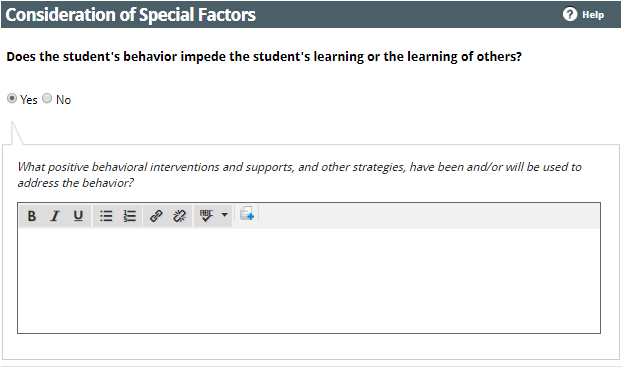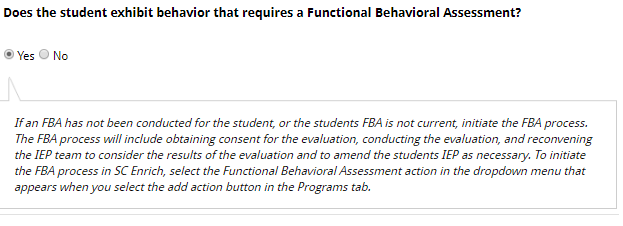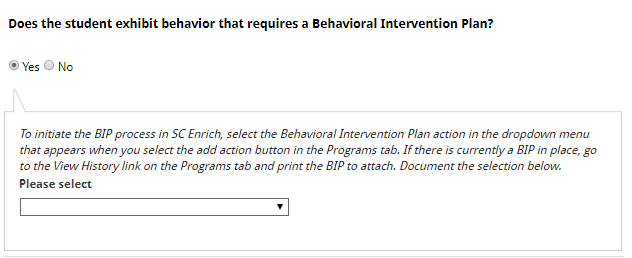

In the case of a student whose behavior impedes the student's learning or the learning of others, the IEP team must consider the use of positive behavioral interventions and supports, and other strategies, to address the behavior. The focus of behavioral interventions and supports through the IEP process is prevention of the interfering behavior(s), rather than the provision of consequences subsequent to the behavior. Special education laws and regulations place a strong emphasis on supports and interventions, including positive behavior interventions and supports that are evidence-based. These strategies are designed to foster increased participation of students with disabilities in general education environments rather than serve as a basis for placing students with disabilities in more restrictive settings. The student's needs and present levels related to the behaviors must be documented in the Present Levels of Academic and Functional Performance section of the IEP. The positive behavioral interventions and supports may be addressed through the IEP annual goals, accommodations and modifications, program modifications, and/or a Behavioral Intervention Plan (BIP).
The level of social and emotional support a student requires in the school setting is provided through the Tiered Level Support System (i.e. Tier 1, Tier 2, and Tier 3) based on the student's individual and unique needs rather than disability category. When addressing a student’s behavioral needs, the Case Manager should first implement Tier 1 strategies. When Tier 1 strategies have been implemented, and the data regarding the effectiveness of the strategies indicate that the student’s behavior has not improved or has worsened, an IEP meeting must be scheduled. The IEP Team should review the data collected and determine further steps including documenting the student's behavioral needs, and considering adding Tier 2 interventions/strategies. Likewise, when Tier 2 strategies have been implemented, and the data regarding the effectiveness of the strategies indicate that the student’s behavior has not improved or has worsened, the Case Manager would schedule an IEP meeting to consider the need for a Functional Behavioral Assessment (FBA), Tier 3. Further information about each of the three tiers with accompanying examples of behavioral strategies are included below.
Tier 1 refers to the behavioral supports that are provided to all students through the general education program, which may include, but are not limited to, the implementation of school-wide discipline procedures and classroom management strategies. Tier 1 behaviors that interfere with learning may include: calling out, not following directions, not keeping hands and feet to self, leaving assigned area, and talking during instruction. If a student is having difficulty complying with the discipline procedures and/or classroom rules, the Case Manager and/or general education teacher should implement general behavior management strategies. Examples include:
If the student demonstrates the need for additional behavioral support after the addition of Tier 1 supports the Case Manager should schedule an IEP meeting. The Case Manager may consider inviting the school counselor and/or school mental health worker to the IEP meeting, since these personnel provide additional school resources to assist students with behavioral and emotional needs. At the meeting, the team should discuss the student's behavioral strengths and needs, and document these in the Present Levels of Academic and Functional Performance. The team should also determine what additional strategies and supports are required to support the learning and behavioral needs of the student. These strategies and supports must be documented in the appropriate sections of the IEP. Strategies and supports that could be documented in the Accommodations Section of the IEP may include:
If the student continues to display behavioral difficulties, even with the implementation of Tier 1 and Tier 2 supports, then the Case Manager should initiate an IEP meeting to review data and determine if a Functional Behavioral Assessment (FBA) is required.
Even though an FBA is typically considered as a component of Tier 3, unique situations may necessitate the IEP team considering the completion of an FBA prior to the implementation of Tier 1 and Tier 2 positive supports and interventions. In these situations the Case Manager should consult with the School Psychologist and Special Education Specialist.
The purpose of the FBA is to identify the function (purpose) of the student’s behavior. This process involves analyzing a wide range of factors, including but not limited to, social factors, environmental factors, and affective factors. Understanding the function of inappropriate behaviors is helpful to the IEP team in developing a Behavioral Intervention Plan (BIP) and/or an educational program designed to reduce or eliminate the behavior.
An FBA may be conducted as part of the triennial reevaluation review process, or an FBA may be conducted as an individual evaluation. Regardless of whether an FBA is conducted as part of a reevaluation review or as an individual evaluation through a Special Review of the IEP, parental consent to reevaluate is required prior to conducting the FBA and all procedural safeguards apply. In addition to the required IEP team members, it is recommended that the School Psychologist be in attendance.
It should be noted an FBA must be conducted following an MDR in which the team determined the behavior is a manifestation of the student's disability and the student does not have an FBA that address the specific behavior.
If an FBA is conducted as part of a Reevaluation Review, the IEP Case Manager initiates the Reevaluation Process in Enrich IEP by consulting with other service providers and completing the Reevaluation File Review. The Case Manager schedules and holds the Reevaluation Planning Meeting (team members should include the School Psychologist and other team members who have data and information to share related to the tiered layers of support provided prior to this meeting). If the team members agree that a reevaluation is required, the Case Manager would provide the parent with the Prior Written Notice outlining the district's proposal to conduct an FBA and provide the data supporting the reasons for this proposal. The Case Manager will request that the parent sign the Consent to Evaluate-Reevaluate. On the Consent to Evaluate form, Functional Behavior Assessment should be selected, along with any other evaluations that the team members agree may be necessary to gather needed information.
The School Psychologist will complete the FBA in Enrich IEP. All evaluation actions and results will be documented by the School Psychologist in the Evaluation Summary Results section of the Reevaluation Process. Upon completion of the FBA and any other assessments conducted as part of the reevaluation review process, the Case Manager will schedule and hold an IEP meeting. At this meeting the results of the FBA and all other assessments conducted will be shared and discussed with the team. The Eligibility Determination form will be completed, and the IEP will be amended as necessary. If the IEP team agrees that a Behavior Intervention Plan is required based on the results of the FBA, a BIP will be developed. Upon completion of the Eligibility Determination form, the projected eligibility date will update. The Case Manager will provide the parent with Prior Written Notice outlining the results of the FBA, the proposal to implement the BIP (if required), and any other revisions required to the IEP as a result of the FBA.
If the FBA is conducted for the sole purpose of developing or modifying a Behavioral Intervention Plan (BIP) for a student, then it can be conducted as an individual evaluation through a Special Review of the IEP. The School Psychologist should be included in this meeting and is responsible for obtaining the FBA Consent for FBA from the Parent/Guardian/Age of Majority Student.
During this Special Review of the IEP, the student’s need for an FBA will be indicated in the Consideration of Special Factors and the Present Levels of Performance sections of the IEP as well as in Prior Written Notice.



To continue to the next section Behavior: Behavioral Intervention Plan (BIP), click Next below.
Behavior Functional Behavioral Assessments